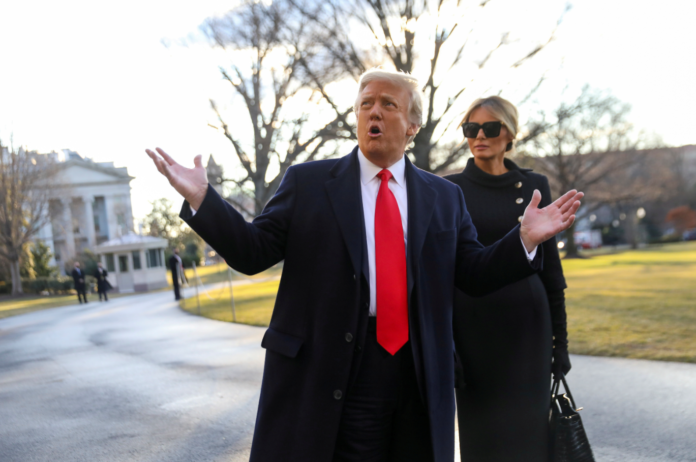A startling revelation has come to light, thrusting former President Donald Trump back into the spotlight under less-than-favorable circumstances. Citizens for Responsibility and Ethics in Washington (CREW), a vigilant watchdog group, has urged the Department of Justice to investigate what they’ve dubbed the “$50 million mystery loan.” This peculiar case revolves around a significant amount reported by Trump, allegedly linked to a Chicago-based entity he owns—a loan that, upon scrutiny, appears to be entirely nonexistent.
According to CREW, this revelation surfaced during a routine examination of Trump’s financial statements, which are mandated under the Ethics in Government Act of 1978. This act ensures that presidential candidates disclose potential conflicts of interest by reporting liabilities exceeding $10,000. Here’s where it gets twisted: the reported $50 million loan, which should reflect a substantial financial liability, seems to be a ghost, with no documentation or trace of its existence.
This phantom loan first caught public attention through a footnote in a broader report by a court-appointed monitor, tasked with overseeing Trump’s business dealings as part of a civil fraud trial in New York. When probed about the loan, responses indicated that it never existed, leading to more questions than answers.
Why would Trump report a non-existent loan? CREW speculates that it could be an elaborate façade, a possible attempt at “debt parking” — a tax avoidance scheme where debt is shuffled around within one’s controlled entities to evade tax liabilities on forgiven debt. Alternatively, it might mask obligations to undisclosed parties, weaving a web of financial deception.
The implications of such fabrications are severe, ranging from hefty fines to potential imprisonment for violating federal disclosure requirements. More so, this isn’t just about flouting financial norms. It’s a matter of public trust and integrity, particularly significant as Trump remains a central figure in American politics, facing multiple legal challenges even as he eyes another presidential run.
Noah Bookbinder, president of CREW, expressed his concerns, emphasizing that Trump’s history of financial discrepancies warrants a thorough investigation. With Trump’s financial dealings already under scrutiny in New York, this new inquiry could compound his legal woes, casting a long shadow over his political aspirations.
As the Department of Justice contemplates this investigation, the timing becomes crucial. With the presidential election on the horizon, any move by the DOJ could sway public perception. However, if launched promptly, this probe could serve as a critical examination of Trump’s ethical and legal standings, influencing his future on the political stage.
In a climate where transparency and accountability are more important than ever, the discovery of this “mystery loan” and the subsequent call for investigation underscore a pressing need to uphold these standards, especially for those in the highest echelons of power. This isn’t just another legal tangle; it’s a test of our commitment to justice and the rule of law, ensuring that no individual, no matter how powerful, is above scrutiny.



